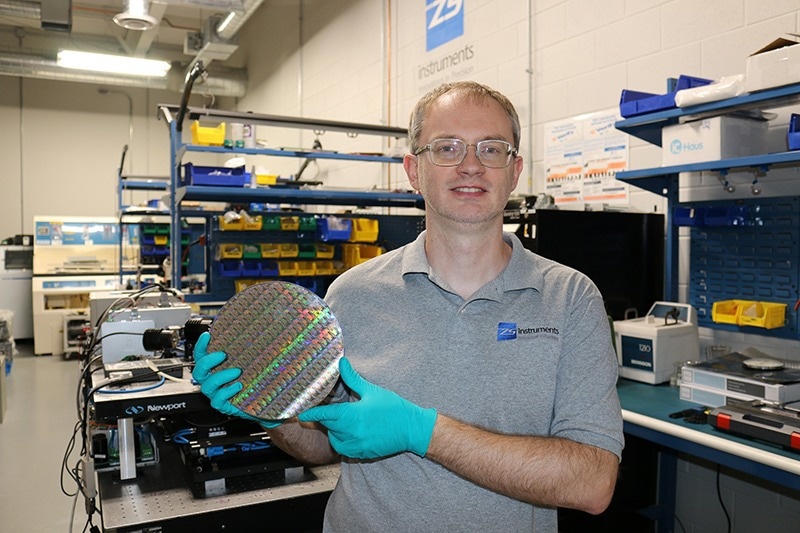A Purdue University-connected startup has received federal funding to innovate an industry projected to reach $4.4 billion by 2028. The funding will be used to improve the manufacture of sensors used in semiconductor fabrication and inspection, precision machining equipment, UAV guidance and tracking systems, medical imaging equipment, industrial robots, and measuring instruments.
 Purdue University alumnus Sergey Zakharov, co-founder and chief technology officer of ZS Instruments, holds an optical encoder wafer created by a prototype of the company’s novel technology. ZS Instruments has received a two-year, $1 million Phase II Small Business Innovation Research, or SBIR, grant from the National Science Foundation to further develop the technology. Image Credit: ZS Instruments
Purdue University alumnus Sergey Zakharov, co-founder and chief technology officer of ZS Instruments, holds an optical encoder wafer created by a prototype of the company’s novel technology. ZS Instruments has received a two-year, $1 million Phase II Small Business Innovation Research, or SBIR, grant from the National Science Foundation to further develop the technology. Image Credit: ZS Instruments
ZS Systems LLC, dba ZS Instruments, has received a two-year, $1 million Phase II SBIR from the National Science Foundation to develop a novel method to produce high-accuracy optical encoders. Optical encoders are sensors that measure position, either linear or angular, and convert it into an electronic signal.
Modern automation and robotics systems heavily rely on encoders for precision positioning and motion control, said Sergey Zakharov, co-founder of ZS Instruments.
“Increasingly accurate encoders are needed to further innovate and enable the manufacturing of complex next-generation products, such as advanced microchips, high-resolution CT and MRI scanners, UAV guidance and tracking systems, high-accuracy industrial robots, and precision measuring instruments,” he said. “As device miniaturization continues, design specifications become more stringent, and the need to fill the demand for high-precision position sensors and the nano-fabrication technology which enable them becomes paramount.”
Improving Upon Traditional Manufacturing
Traditional encoder production is a process that introduces defects and errors into encoders and limits their accuracy and resolution. ZS Instruments is working with Alexander V. Kildishev of Purdue’s Elmore Family School of Electrical and Computer Engineering to develop a novel technology that combines a high-resolution projection lithography system with additive manufacturing to create highly uniform microscopic patterns with extremely low-edge roughness.
“The new approach offers numerous advantages, including economically viable production of precision encoders with sub-nanometer resolution, improved manufacturing yield and shorter lead times,” Zakharov said. “The Phase II research activities encompass the development of a full-size hardware prototype with performance traceable to standards established by the National Institute of Standards and Technology. ZS Instruments will also establish the necessary infrastructure to support the newly developed technology.”
Zakharov said applications of the developed tool extend beyond optical encoders into other industry sectors such as semiconductor chip manufacturing, advanced packaging and precision additive manufacturing.
The Phase II grant builds upon research funded by an 18-month, Phase I SBIR grant from the NSF. Kildishev was a sub-awardee; he disclosed information about the innovative tool to the Purdue Innovates Office of Technology Commercialization, which has applied for a patent on the intellectual property. The Phase I prototype has already demonstrated an order of magnitude improvement in both resolution and edge quality.
ZS Instruments’ Purdue Connections
Sergey and Wei Zakharov co-founded ZS Instruments; Sergey also serves as chief technology officer. He is an alumnus of Purdue’s School of Aeronautics and Astronautics; Wei is an associate professor and engineering information specialist at Purdue Libraries and School of Information Studies. The company is a client of the Purdue Innovates Incubator, which provides resources to de-risk Purdue-related startups and early-stage technology.
“We have been closely collaborating with the Birck Nanotechnology Center in Discovery Park District at Purdue and will perform parts of the Phase II R&D efforts there,” Sergey Zakharov said. “We also will be establishing a one-of-a-kind precision calibration facility in Lafayette with full traceability to NIST standards.”